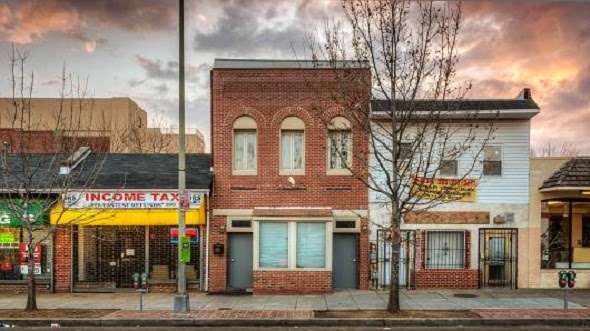Crowdfunding Becomes a Hot Property in Real Estate Investing
 |
| Sam Kittner, CNBCThe Fundrise crowdfunding platform plans to raise $350,000 to invest in the red brick building above |
The vacant, two-story brick building at 1539 Seventh St. in the Shaw neighborhood of Washington, D.C., is not exactly what you would expect to attract enthusiastic crowdfunding. After all, it's not some new technology, or on the cutting edge with a breakthrough marketing strategy. It's just an empty building. But the fact that the former home of a hair salon is raising tens of thousands of dollars over several days shows the extent to which crowdfunding is being utilized, even for local real estate development.
Fundrise, a crowdfunding platform for commercial real estate, is offering shares in the D.C. building to investors, not only to those in the city but in Maryland and Virginia. The developer WestMill
"The benefits are tangible."
Capital Partners plans to turn the building into a boutique retail site. Shaw, once home to jazz legend Duke Ellington, is undergoing a bit of a renaissance and Fundrise sees big opportunities.The $1.5 million development plans to use $350,000 from crowdfunding. For as little as $100, investors can buy a share. Fundrise is projecting an 8 percent return paid quarterly, with a five-year redemption. The maximum a person can invest is $2,500. As of Friday afternoon, $200,000 had been raised from 200 investors.
Karan Jain bought one $100 minimum share in the building, his second $100 investment in a crowdfunding project. Jain, 26, sees it as his entry point into real estate. "I'm fairly young and don't really own any property myself," he said. "One thing these projects have done is democratized the process of owning a piece of the real estate deal."
Jain's investment also comes with non-monetary rewards, like invitations to social events and the chance to have input in a project, including testing the food at a restaurant planned for a new development. "The benefits are tangible," he noted. No less tangible are the business lessons Jain can witness. He has started a crowdfunding platform of his own called Clovest, which helps D.C. businesses raise capital.
Fundrise has done 18 projects, raising more than $10 million, including nearly $1 million from three "unaccredited" deals. Projects that are unaccredited mean investors don't have to have high net
"If you decide to invest $100, what type of return are you really looking for?"
worth. But the offers to unaccredited investors have been restricted by geography and dollars."We wanted to make sure that no one person put too many eggs in one basket," said Fundrise CEO Ben Miller. The limits are also a way to satisfy regulators. While the JOBS Act, signed into law April of 2012 promised to open up equity crowdfunding, the Securities and Exchange Commission has yet to finalize the rules.
For Miller, that means extra time to get a deal off the ground. "We have to get every state we sell in to approve the offering. This offering we had to get the (approval of) SEC, Maryland, Virginia state securities regulators and D.C. We had four separate securities regulators to review this thing and approve it."
Christian Faes, co-founder at LendInvest, explains that the crowdfunding platform offers peer-to-peer lending for mortgages, focused on the "short-term mortgage market." Mark Mascia, who runs his own real estate investment firm, wanted to make a $1,000 investment through Fundrise in the Shaw project. Mascia says his interest is in part about testing the waters to see if his firm wants to use crowdfunding for its own development projects.
"It's partially a CEO, 'eat your own sausage' kind of thing, to see how the process is going to work for our investors if we do use the platform." Mascia, a former resident of Virginia who now lives in New York, was turned away because he lives outside the area. "This has been the hardest and most frustrating part of Fundrise is their local restrictions."
Attorney Matthew Nutting, who has developed a specialty in crowdfunding, expects real-estate deals have high risk, but said investors may be willing to risk smaller sums of money for greater potential reward. "If you decide to invest $100, what type of return are you really looking for? For a lot of people, they'd rather lose $100 or make $100," he said. "It's sort of that mentality since it's such a small dollar amount in many cases." He also said investors interested in these types of projects usually have motives other than just investment returns, like having a say in the development.
Fundrise's Miller said the Shaw project raised $100,000 from 100 investors in the first hour and a half when the offer went live on March 26. "This one seems to be moving faster than usual," said Miller, who said he expects it is because offers to unaccredited investors are still so rare.
http://video.cnbc.com/gallery/?video=3000240178

Comments
Post a Comment